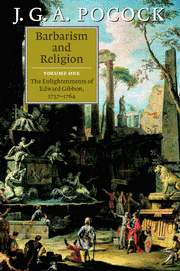Book contents
- Frontmatter
- Contents
- Acknowledgements
- Note on references, quotations and translations
- List of abbreviations
- Introduction
- PART I ENGLAND AND SWITZERLAND, 1737–1763
- PART II THE ENCOUNTER WITH PARIS AND THE DEFENCE OF ERUDITION, 1761–1763
- 6 The politics of scholarship in French and English Enlightenment
- 7 Erudition and Enlightenment in the Académie des Inscriptions
- 8 D'Alembert's Discours préliminaire: the philosophe perception of history
- 9 The Essai sur l'étude de la litterature: imagination, irony and history
- 10 Paris and the gens de lettres: experience and recollection
- PART III LAUSANNE AND ROME: THE JOURNEY TOWARDS A SUBJECT, 1763–1764
- Epilogue: Gibbon and the rhythm that was different
- List of references
- Index
8 - D'Alembert's Discours préliminaire: the philosophe perception of history
Published online by Cambridge University Press: 15 December 2009
- Frontmatter
- Contents
- Acknowledgements
- Note on references, quotations and translations
- List of abbreviations
- Introduction
- PART I ENGLAND AND SWITZERLAND, 1737–1763
- PART II THE ENCOUNTER WITH PARIS AND THE DEFENCE OF ERUDITION, 1761–1763
- 6 The politics of scholarship in French and English Enlightenment
- 7 Erudition and Enlightenment in the Académie des Inscriptions
- 8 D'Alembert's Discours préliminaire: the philosophe perception of history
- 9 The Essai sur l'étude de la litterature: imagination, irony and history
- 10 Paris and the gens de lettres: experience and recollection
- PART III LAUSANNE AND ROME: THE JOURNEY TOWARDS A SUBJECT, 1763–1764
- Epilogue: Gibbon and the rhythm that was different
- List of references
- Index
Summary
We have now to consider what d'Alembert intended in the Discours préliminaire à l'Encyclopédie: what were the foundations of its critique of erudition, and what had this to do with his desire to stabilise a class of gens de lettres? These questions must be explored in the light of a further generalisation: d'Alembert was by no means indifferent to history, but set up a contrast between an ideal and an actual history which led him to some remarkable historical insights. The Discours presents both a scheme of ‘l’ histoire philosophique que nous venons de donner de l'origine de nos idées', and a study of ‘l'ordre historique des progrès de l'esprit;’ and d'Alembert is clear as to the distinction between a ‘natural history’ of the human mind and the study of its development in actual or civil history, the product of contingency as well as nature:
nous avons suivi dans le Système encyclopédique l'ordre métaphysique des opérations de l'Esprit, plutôt que l'ordre historique de ses progrès depuis la renaissance des lettres …
[we have followed the metaphysical order of the operations of the mind in the encyclopedic system rather than the historical order of its progress since the renaissance of letters.]
The sharp distinction here drawn between scientific model and historical narrative heightens d'Alembert's awareness of the latter and does not tempt him to dismiss it as trivial, and Gibbon probably objected to nothing in d'Alembert's history of the enlightened mind beyond the practical implications of its epistemology.
- Type
- Chapter
- Information
- Barbarism and Religion , pp. 169 - 207Publisher: Cambridge University PressPrint publication year: 1999



